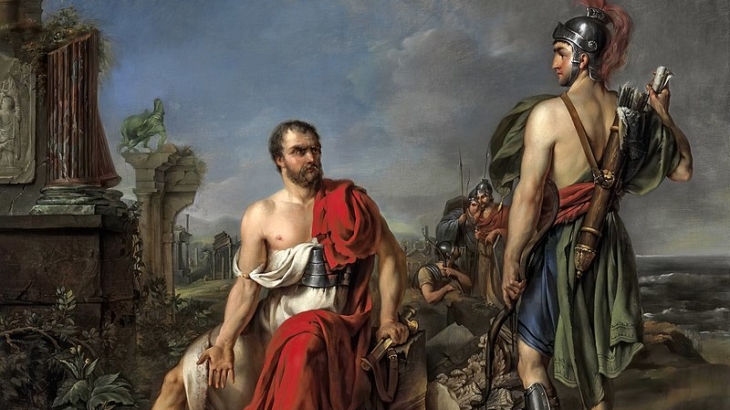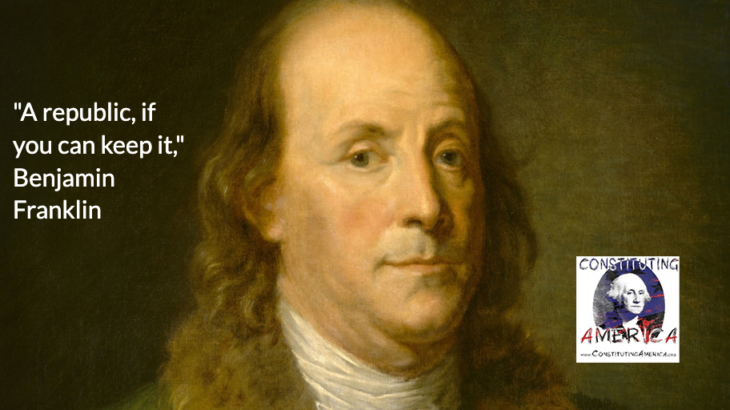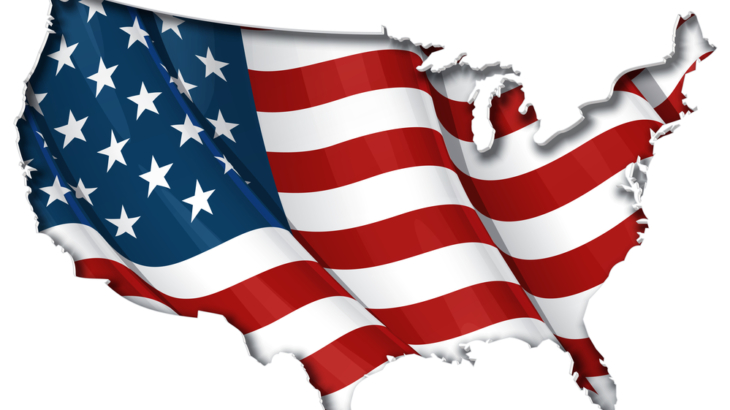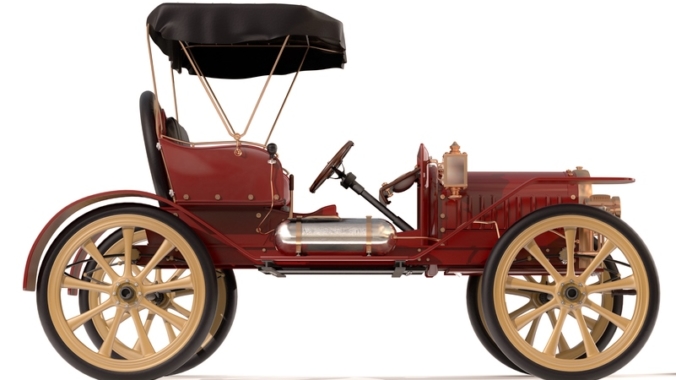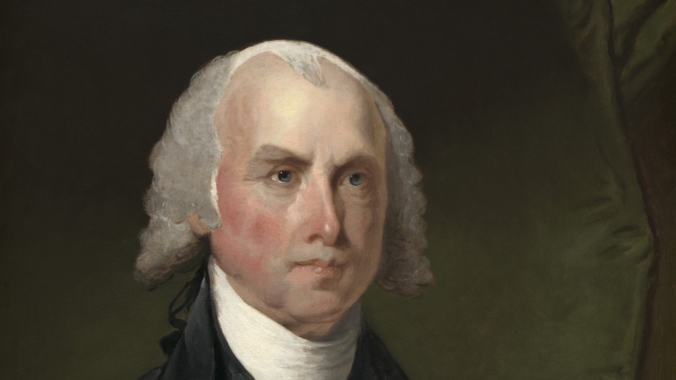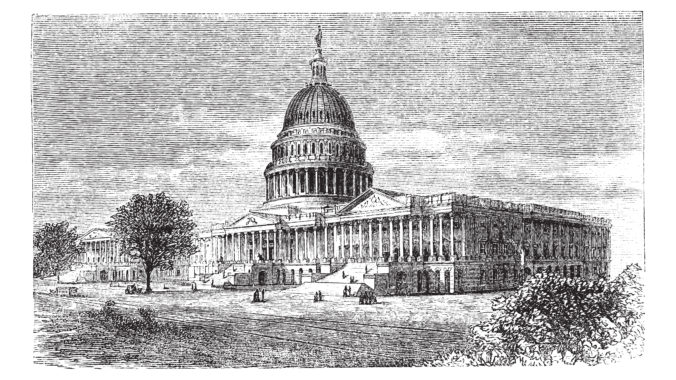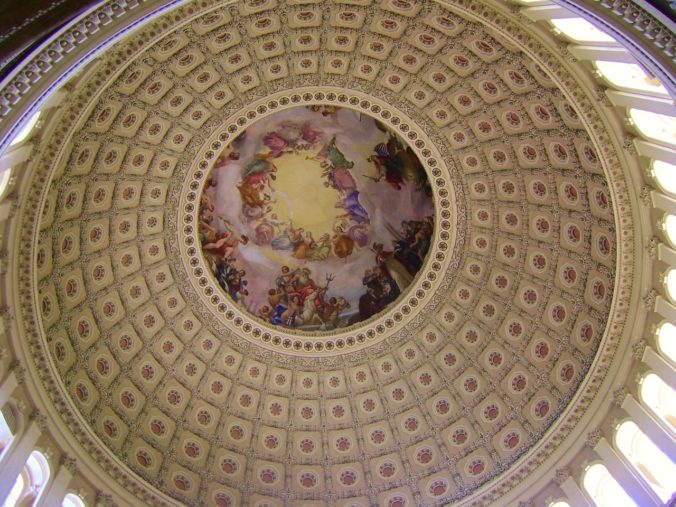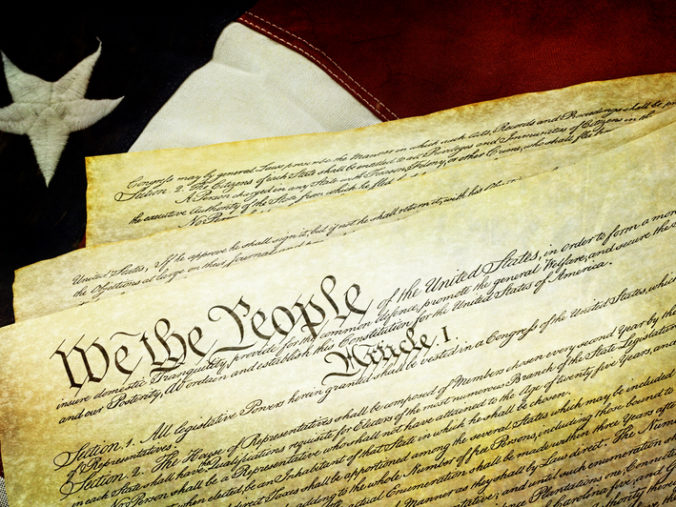Guest Essayist: William Morrisey
LISTEN ON SOUNDCLOUD:
If the writers contributing to this year’s 90-Day Study have identified a main theme for their essays, it is the difference between the way Congressional representatives understood their Constitutional duties in the first century-and-a-quarter of our Union and the ways Congressmen have come to act since Progressivism came to dominate American opinion. From a lawmaking institution whose members consulted the Constitution and, behind it, the natural rights enunciated in the Declaration of Independence, Congress has become a constituent-service institution which attempts to oversee and negotiate with the bureaucratic apparatus of a massive national state. To be sure, it still debates and enacts laws, but very often leaves the details of those laws to the administrative agencies which enforce them, agencies which collectively amount to a fourth branch of government, and an unelected one at that. Given the re-conception of the Constitution as a ‘living’ or ‘elastic’ document, those laws may have only a remote connection to the plain meaning of the (formerly) supreme law of the land.
It has become difficult for us even to conceive of the way Congress once operated, and indeed how American politics and government generally once operated. For this, we need to turn to an eyewitness, and as luck would have it, we have one.
At the age of twenty-four, a future newspaper reporter and editor, recently a schoolteacher in the Erie Canal town of Lockport, New York, met and took the measure of the most distinguished cohort of United States senators in our history as those men attempted to navigate the American Union around the most dangerous regime crisis since the American Revolution itself. Thomas Jefferson had predicted that the presence of slaves in the land of the free was “the rock upon which the old Union would split,” and that rock sat just beneath the surface when Oliver Dyer arrived for work at the Senate for the session of 1848-49.
The Mexican War had just concluded, and new territories wrested from Mexico, including California, had been annexed. The plantation oligarchs who controlled the governments of the Southern states had seen that only the acquisition of new territories and ultimately the addition of new states in which slavery was legal, would protect their ‘peculiar institution’ (and thereby their political power) from the solidly anti-slavery Northern states, which were outpacing the South in population and industrial wealth. With popularly-based House of Representatives firmly in Northern hands, and likely to remain so, the Senate, its membership unaffected by population shifts, stood as the oligarchs’ best power base for defending their regimes and even extending their influence in the federal government. As Dyer writes, “It was the fixed policy of the South to keep the free States from outnumbering the slave states.”
With the sympathetic James K. Polk in the White House, “the war was forced on for the purpose of acquiring territory into which slavery could be extended.” But the bill appropriating funds for fighting the war had a rider attached by Pennsylvania Democratic House member David Wilmot of Pennsylvania, stipulating that no territories acquired from Mexico would allow slavery. This “greatly embittered and exasperated the South,” “for it struck at the very life of slavery, inasmuch as to limit slavery was to strangle it.” The Wilmot Proviso eventually “was killed in Congress,” but “it survived in the country,” and Dyer now knew as he wrote his memoir in 1889, the regime struggle between Southern oligarchic regimes and Northern republican regimes would end only at Appomattox or, more accurately, only with the post-Civil War attempt at ‘Reconstruction’ or regime change in the South by the triumphant republicans.
As early as the 1830s, genuinely factional political parties had begun to arise in the United States. The Founders had hoped to avoid the formation of such parties, parties organized not merely around various local interests and divergent national policies, but the fundamental issue of what kind of political regime the United States should have. The Founders had hoped that they had settled this matter: The United States was to be a democratic and commercial federal republic. But as the invention of the cotton gin made slaveholding more profitable, Southern plantation owners consolidated oligarchic instead of republican regimes in their states. The struggle between democratically-based republicanism and slaveholder-based oligarchy commenced.
The struggle began within the Democratic Party. Although a slaveholder, Andrew Jackson based his electoral successes in 1828 and 1832 squarely on a popular base; the Democratic Party he established, with the help of his Northern ally, the brilliant political organizer Martin Van Buren, was indeed a democratic party. Opposing him, however, was an even greater organizer and far superior political theoretician, South Carolina Senator John C. Calhoun. Explicitly rejecting the moral foundation of American republicanism as enunciated in the Declaration of Independence—the equal, unalienable rights to life, liberty, and the pursuit of happiness held by all human beings as such—Calhoun instead maintained that the laws of nature and of nature’s God ordained a racial hierarchy entitling plantation oligarchs to rule African slaves without their consent.
Opposing both Jacksonian mass democracy and Calhounian oligarchy, the Whig Party formed in the 1830s out of the remnants of the old, long-defunct Federalist Party, John Quincy Adams’s anti-slavery National Republican Party, and even the short-lived Anti-Masonic Party, which had suspected the secretive Freemasons of conspiring against republicanism. The Whigs wanted to maintain Constitutional safeguards on undiluted majority rule, opposed the extension of slavery into the territories, supported a national banking system as well as interstate railroads and canals, to be funded by protective tariffs which would also defend newly-founded American industries against foreign competition. Whereas the Democrats, still the majority of American voters, found themselves split between Jacksonian republicans and Calhounian oligarchs or ‘aristocratic republicans,’ the Whig coalition had stayed sufficiently unified to elect William Henry Harrison to the presidency in 1840.
The party system had a function that we today might easily overlook. Today, we are accustomed to seeing the administrative tasks of government performed by university-trained professional administrators. But throughout the nineteenth century there was no such class in the United States; professional bureaucracies were a European phenomenon. Who, then, did the administrative work of government in those days? None other than the political parties. Each newly-elected president would appoint ‘his’ partisan supporters to the government, from Cabinet officers down to local postmasters. With so many jobs at stake, interest in election ran very high. With the dangerous and impassioned debate over the character of the American regime on one hand, and the material interest in who would find comfortable work on the other, no one complained of political apathy in the America of that time.
This is where Oliver Dyer’s story begins. Son of a shoemaker, Dyer learned a more promising trade, studying shorthand stenography—what its inventor, the Englishman Isaac Pitman, called “Sound-Hand” in a widely-distributed 1837 pamphlet. (You listen to a “sound”—a speaker’s voice—then hand-write what he says in an abbreviated code which allows you to keep up with even a fast-talking Congressman). Adding some improvements of his own, Dyer marketed the Pitman System to schools and quickly caught the attention of upstate New York politicians, who arranged for him to serve as a recorder for both the Whig Party’s and the anti-slavery Free Soil Party’s conventions of 1848.
There young Dyer learned the ‘low’ side of politics, the politics of party insiders and wire-pullers. He begins his memoir, Great Senators of the United States of Forty Years Ago, with an account of how the Albany-based Whig boss—the marvelously-named Thurlow Weed—teamed with his protégé William Seward to manipulate delegates into nominating Mexican War general Zachary Scott over the celebrated Kentucky Senator Henry Clay—adding, in the bargain, another Weed man, Millard Fillmore, to the ticket. For good measure, Weed then extended a tentacle into the Free Soil Party convention (held on his home turf in upstate New York), arranging the nomination of former president Martin Van Buren. With the erstwhile Democrat Van Buren drawing votes away from Democratic Party nominee Lewis Cass (a “dull, phlegmatic, lymphatic, lazy” Michigan senator “without an atom of magnetism in his nature,” allied with the Calhoun Democrats), Weed’s beneficiary Taylor carried New York and with it the nation. Poor Clay never knew what hit him, but Oliver Dyer did.
Dyer explains “the secret of [Thurlow Weed’s] political power” under the old party-based system of American politics. Newspapers at that time were owned and operated by political parties, and Weed controlled the Albany Evening Journal. Albany was more important than New York City, not only because it was the state capital but because Manhattan Island was icebound in winter; astonishingly to us today, there were no railroad lines running out of Manhattan, whereas politically-connected Albany had them. Weed wrote a regular column in his newspaper, making strategic mention of his political friends and foes alike as he kept the lines of communications open between himself and New York Whigs. “There was seldom a young man, in any part of the State, who gave promise of becoming a person of influence, that was not kindly and flatteringly mentioned in that column, no matter to what party he belonged. And does any one suppose that young men thus mentioned would not feel friendly to Thurlow Wed, and be ready to do him a personal favor?” Indeed so: “Mr. Weed’s kindness, shown at a time when the young man feels the need of a friend, sinks into the depths of his heart and brings forth fruit abundantly.” This beneficence toward the young, who “are perpetually coming on” the stage as “the old are constantly passing off,” extended not only to his fellow Whigs but to young Democrats, as well. But much more than this, Weed proved a supremely artful political boss, ruling not by command but by influence. After all, he controlled the elected officials who controlled the distribution of jobs. As another young man, Henry Adams, had occasion to observe some years later, Mr. Weed was an entirely unselfish man in one way: he gave but he never took, arranging employment and expecting not mere lucre but only political gratitude in return.
His reportorial credentials and political alliances thus established, it is no wonder that Oliver Dyer found himself on the floor of the United States Senator in December 1848, recording the speeches of John C. Calhoun, Thomas Hart Benton of Missouri, Daniel Webster of Massachusetts, and of Henry Clay himself—the man Abraham Lincoln would call “my beau ideal of a statesman.” From well-played ‘low’ politics to the very high: For the next year Dyer received the best political education of any future journalist of his generation, and maybe of any generation in America. He sketches portraits of all these men, and of several other Senate eminences besides.
He begins with Sam Houston from the newly-admitted state of Texas, “about whose name more romance clustered at that time than encircled the name of any other citizen,” formerly the governor of Tennessee at the age of 34, then self-exiled to Cherokee territory where he “liv[ed] in barbaric dignity” for a short time before capturing Mexican general Santa Anna during the Texas War of Independence, rising to the presidency of the Republic of Texas, and then to election as senator in 1845. Houston had been Dyer’s hero as a boy in Lockport. “As we children on the Niagara frontier were brought up to hate the British, wild beasts, Indians, and foes of every kind whatsoever, and were taught to believe in the good old-fashioned fire and brimstone hell, and in cognate Scripture tenets, undiluted with any revisionary Sheol or Hades, I suppose that our militant religion had a robustness and an edge which are impossible to the faith of boys brought up on the humanitarianism and the diluted theology of the present day. At any rate, we all prayed fervently to God to avenge Travis, Crockett and Bowie on the Mexicans.” So much so, that “Twenty-four boys, of which I was one, formed a company to march down and ravage Mexico; but news of Houston’s defeat and capture of Santa Anna at San Jacinto came in time to save that ill-fated republic from the impending invasion.” “We were simple people who believe in God, and loved heroes who won battles in accordance with our prayers; and from that time General Sam Houston was set in our hearts alongside Jackson and Washington.” Nor did Senator Houston disappoint his admirer. Although his experience with Whig and Free Soil Party politicians “had rather chilled my expectations as to all sorts of heroes,” Houston proved “a magnificent barbarian, somewhat tempered by civilization.” True, his “wild life” had “unfitted him for civilization,” so that he “was not a man to shine in a deliberative assembly,” but Dyer found him “a sincere lover of his country,” “indomitably patriotic,” standing “firm by the Union to the day of his death” in 1863.
An anti-slavery Union man himself, Dyer first found Calhoun “to be a perfect image and embodiment of the devil,” with an inner complexion of a dark soul shining through the skin of his face.” But upon Calhoun speak, he reconsidered. In debate, Calhoun maintained “his dignified demeanor and exquisite courtesy to the end” under the slashing attacks of Senator Benton, the unbending foe of the Calhounite principle of states’ rights and even secession in the defense of slaveholding. As was his wont, Calhoun took the time to explain his political principles to the earnest young Yankee; prudent attentiveness to the young was not monopoly of Mr. Weed. Dyer faithfully recalls Calhoun’s argument, which hinged on his claim that each state within the United States is “a sovereign state,” inalienably so, with natural rights placed “in the hearts and minds of individual freemen.” Dyer does not call the reader’s attention to the distinction between “freemen” and the Declaration’s “all men,” as Senator Calhoun surely did not. “As I became better acquainted with Calhoun, I liked him better. At last, I had a genuine affection for him, and mourned over what seemed to me to have been his political decadence; and I have mourned over it to this hour.” Dyer learned from Calhoun—who had forgiven his bitter rival, Jackson—“to distinguish between a man’s principles and his personal character, and there developed in me a disposition to extend to the convictions and conduct of others the same forbearance and charity which every man likes to have accorded to his own conduct and convictions.” But this does not cause him to omit quoting a speech Calhoun had made years earlier, in which he averred that although “many in the South once believed that [slavery] was a moral and political evil,” “we [now] see it in its true light, and regard it as the most safe and stable basis for free institutions in the world.” The regime issue had been joined, with men of outstanding character and ability on both sides.
In Thomas Hart Benton of Missouri, Calhoun had “a bitter and relentless foe,” as well as a formidable one. “It would be difficult to find two other contemporary Americans, of equal distinction, so absolutely contrasted in body, mind, principles, tastes and manners as were Benton and Calhoun.” “To rub Calhoun’s nature”—physically slender, theorizing, gentlemanly—“against Benton’s”—physically massive, practical, tough to the point of ruthlessness—“was like rubbing the tender skin of an infant against the corrugated hide of a rhinocerous.” Indeed, this “Roman gladiator who somehow had become embedded in the nineteenth century,” this “robust and ferocious Christian,” had a servant scrape his body daily with “the roughest kind of horsehair brush,” callousing his skin and toughening his mind for political combat. (“The Roman gladiators did it, sir”—the word “sir being a formidable missile on his tongue.” Benton’s “egoism was so vast, so towering, so part and parcel of the man, that it was not at all offensive and never excited disgust,” being “as proper to him as its apex is to a pyramid.” The “old ironclad” loved the things that were his own: his country (hence his hatred of Calhoun, who wouldn’t have minded breaking it up) and his family above all. Her mind broken by a stroke, Mrs. Benton once appeared unexpectedly at a reception held in their home for a French prince; Benton took her by the hand, seated her beside him, and carried on the conversation “with that impressive dignity in which it is doubtful if he had an equal.” When asked if he would obey protocol and kneel before the Czar, he stood on his republican dignity: “No sir! No sir! An American kneels only to God and woman, sir.” Unlike Calhoun, “he was a staunch friend of the poor—of poor blacks, as well as poor whites,” and when in the Tennessee legislature he introduced a bill providing jury trials for slaves.
The aristocratic Calhoun and the democratic warrior Benton found their complement in Henry Clay, a man of “good nature” and “inborn democratic republicanism.” With his photographic memory for persons, names, and places, Clay made any stranger—“however humble in station”—feel “at once at home with the affable and cordial Kentuckian.” In floor debate, Calhoun drew his listeners to him with his high-mindedness; Benton drew them into an ego so capaciously American as to make them want to join with it. Clay “spoke to an audience very much as an ardent lover speaks to his sweetheart when pleading for her hand.” As Clay’s recorder, Dyer saw that “the more successful a lover’s speech is on such an occasion, the less readable it is when it gets into cold print,” but Clay carried his fellow senators along with “his hearty and sympathetic spirit of fellowship”—the sort that, he hoped, might pervade his beloved Union. Clay loved commerce, industry, and hard work not out of love of profit but love of country. “Clay was poor—poor notwithstanding his thirty-five years of public service; for he was not one of those statesmen who, on a five-thousand-dollar salary, manage to lay up two hundred fifty thousand dollars per annum.”
If his peers were remarkable for their character, Daniel Webster outshone them in intellect. “Webster was somewhat lacking in character”; having won a point in principle, “he would lapse into indifference and suffer the fruits of his victory to be snatched from him by men of inferior intellect.” But in intellect he had no equal among the public men of that day—not even Calhoun. “The perfection of common sense,” his mind in debate kept together the details of the bill he argued for or against; the rules of the Senate; the character of each senator he engaged; the fundamental principles of the Union. “If it had not been for Webster, Calhoun would have carried everything before him.” In his published speeches in defense of natural-rights republicanism “he taught the country what the true nature of its government is,” out of the teachings of the Founders. “He logically, powerfully, clearly and popularly demonstrated the baneful character of the disunion and secession heresy,” and in so doing set in motion the resolve of those people who finally preserved it.
Dyer among them. After his year in the Senate he studied and practiced law, in Washington, but soon moved to journalism in New York, where he wrote for and edited several major newspapers. Having learned politics, low and high, before he began to write about them, he campaigned courageously against the city’s underworld, siding with embattled religious and civic reformers. In 1852 he promoted the career of Sarah Willis, who became the first regularly-featured woman newspaper columnist in America after Dyer hired the divorced mother of two boys, doubling her previous salary. Like his heroes of ’48, he wasn’t afraid to take risks for the right as he saw it. And like his old benefactor, Mr. Weed, he’d pull a string or two for a young talent.
By 1889, when Dyer published his reminiscences, the Civil War had been won but the political reconstruction of the Southern states along republican lines had in many respects failed. Now allied with poor whites against the freedmen, the oligarchs had recovered much of their power. Northerners had decided to move on, hoping for a gradual amelioration of race relations. Dyer concludes with a benediction for all the great senators “of forty years ago,” including Calhoun, despite “his unfortunate political aberration.” Dyer couldn’t know, and would not live to see the new political aberrations of the century to come, at home and abroad. We who have seen them will also see why Congress again finds itself sharply factionalized: Congress members and many voters sense that the regime issue once more is at stake, as it was in the decades leading to the Civil War. Because Progressivism altered the structure and therefore the character of American government and education, we no longer have senators capable of stating the principles beneath today’s conflict. This leaves it for citizens themselves to recover the meaning of the American Constitution as understood by its framers.
Will Morrisey is William and Patricia LaMothe Professor Emeritus of Politics at Hillsdale College, and is a Constituting America Fellow; his books include Self-Government, The American Theme: Presidents of the Founding and Civil War and The Dilemma of Progressivism: How Roosevelt, Taft, and Wilson Reshaped the American Regime of Self-Government.

 Will Morrisey is Professor Emeritus of Politics at Hillsdale College, editor and publisher of Will Morrisey Reviews, an online book review publication.
Will Morrisey is Professor Emeritus of Politics at Hillsdale College, editor and publisher of Will Morrisey Reviews, an online book review publication.
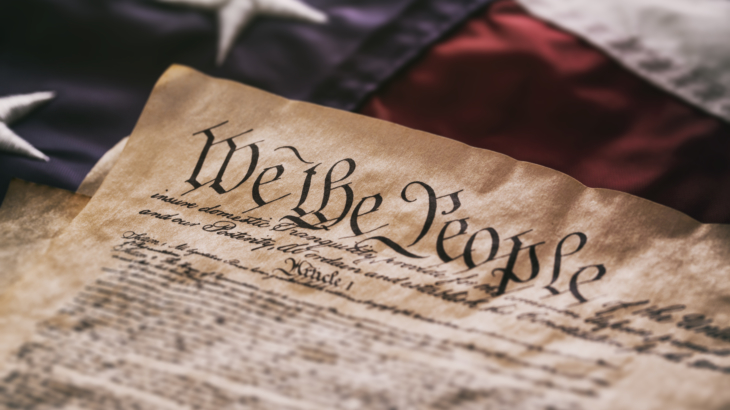
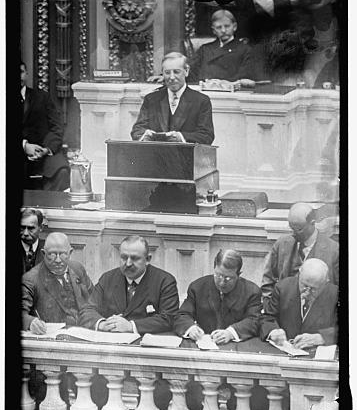 https://en.wikipedia.org/wiki/Woodrow_Wilson#/media/File:Congress_opening_message_63rd_02406a.tif
https://en.wikipedia.org/wiki/Woodrow_Wilson#/media/File:Congress_opening_message_63rd_02406a.tif Will Morrisey is Professor Emeritus of Politics at Hillsdale College, and Editor and Publisher of Will Morrisey Reviews.
Will Morrisey is Professor Emeritus of Politics at Hillsdale College, and Editor and Publisher of Will Morrisey Reviews.